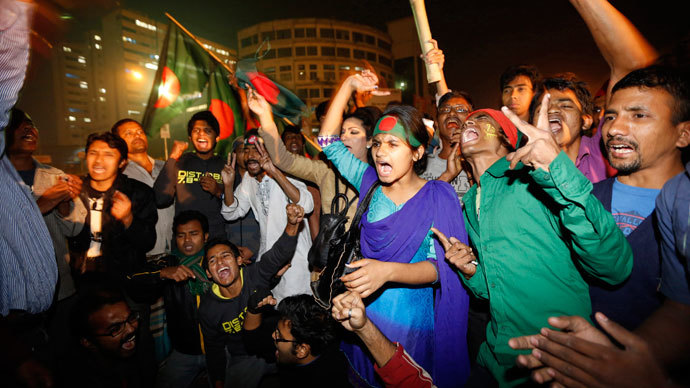Democracy vs. elections in Bangladesh and Thailand

Despite their distinct and unique domestic political trajectories, Bangladesh and Thailand are today facing eerily identical threats to democracy.
In both these populous Asian nations, the main opposition political parties have declared boycotts of general elections, jeopardizing the legitimacy of the polls and the futures of their people. The games of electoral brinkmanship being played in these two theaters are stoking violence and chaos, imperiling economic growth.
Who governs the election?
Bangladesh and Thailand have witnessed such politics of deadlock before, and it is the bitter memory of the past that is presently precluding compromise. In the former, Begum Khaleda Zia’s Bangladesh Nationalist Party (BNP) claims that the ruling Awami League (AL), under Prime Minister Sheikh Hasina, cannot be trusted to conduct a free and fair election, slated for January 5th, and that it should hand over power to a non-party interim caretaker government.
The concept of a custodian-like neutral regime without political party representation to oversee elections used to be a constitutional norm in Bangladesh until Prime Minister Sheikh Hasina abolished it in 2011. This act stemmed from her grievance against the military-backed caretaker system of 2006-2008, which delayed elections, overstayed its mandated three months, and interrupted democratic rule until she swept back to power. In the words of the prime minister, “we can't allow unelected people to oversee national elections.”
A lame duck franchise
But Sheikh Hasina’s unilateral striking down of the practice of non-partisan caretaker governments has engendered mortal fears in the BNP’s top brass. They fear that the Prime Minister could abuse her authority over the executive and the state paraphernalia to rig the elections on January 5th. Her offer to invite BNP politicians into a coalition caretaker government, in which the opposition would have equal number of ministerial berths as the ruling party, has been unpalatable to Begum Zia.
The BNP’s ensuing boycott call has produced a farcical situation, where more than half the constituencies in Bangladesh’s parliament have been declared to be won by AL’s candidates unopposed before a single ballot has been cast. Despite diligent attempts by foreign diplomats to persuade both sides to reconsider their hardening positions, the prime minister’s party is determined to hold voting on January 5th come what may (including an image-hurting decision by foreign governments not to deploy international election observers).
If trends are anything to go by, the BNP swept four crucial mayoral elections in June this year, seemingly confirming the traditional anti-incumbency factor in Bangladeshi general elections. Supposing the BNP does carry the tide of disaffection among various sections of the populace against corruption scams and anti-Islamist war crimes trials of the AL government, the former’s boycott would render the upcoming election not only procedurally flawed but also politically meaningless. The potential winner would be sitting out and the apparently unpopular prime minister may keep ruling without a true mandate.

Déjà vu of follies
Even if the will of the majority of Bangladeshi voters is with Prime Minister Hasina, the possibility that she gets re-elected without any contest will taint the rest of her political career. The ever ominous shadows of the Bangladeshi military and of the fanatical Jamaat-e-Islami, which has been banned as illegal by the country’s High Court, could take center stage if Sheikh Hasina attempts to govern by ramming through a hollow and incomplete election.
The Bangladeshi prime minister should wind the clock back to 1996 and recall how her AL, which was then in opposition, had boycotted general elections and allowed Begum Zia to sweep to power with a landslide victory that proved pyrrhic. Within a month, the BNP had to renounce office under pressure from popular protests, and fresh elections with the participation of all key parties resulted in the AL’s win. The upcoming election on January 5th is a saga of folly repeated with no lessons learnt.
Aristocracy versus the people
Thailand’s crisis has been building up through mass protests and occupation of key government buildings by the opposition Democrat Party and its affiliates against the ruling Pheu Thai Party (PTP). It too involves an election boycott. The main difference, however, is that the Democrat Party is absolutely sure of losing the elections set for February 2nd. Its leader and former prime minister, Abhisit Vejjajiva, wants Prime Minister Yingluck Shinawatra to resign and hand over power to a neutral interim government that will institute “reforms” to the political system before elections.
The Thai opposition’s desired reforms include replacement of the basic democratic concept of rule by the majority with an appointed ‘council’ representing various professions and the interests of Thailand’s conservative power base concentrated in the military and the royal family. The royalist ‘yellow shirts’ unabashedly criticize the principle of one-person-one-vote on the grounds that Thailand’s illiterate hoi polloi who have been religiously voting for Prime Minister Yingluck and her exiled charismatic brother, Thaksin Shinawatra, are politically immature and gullible.
While the BNP in Bangladesh is still a mainstream party that was in power until 2006 and commands vast pockets of mass support, the Democrat Party in Thailand is a classic establishment animal that has not won a single election since 1992. The Shinawatras, who have mobilized the rural poor in the populous northern region of Thailand, have been acing every election held since 2001. They have raised the sense of political efficacy of average Thais as part of a long-term radical strategy of attenuating the old aristocratic elites represented by the Democrat Party.
Back to the military?
Unlike the BNP, whose opting out of Bangladeshi elections leaves the polls empty in both form and substance, the absence of the Democrat Party in Thailand’s February 2nd elections will not affect the legitimacy of the result per se. But Prime Minister Yingluck remembers that the last time the opposition boycotted an election in 2006, it paved the way for total destabilization of her brother Thaksin’s regime and culminated in a military coup d’etat.
Holding elections without the Democrat Party’s participation could invite yet another direct or behind-the-scenes army intervention at a delicate moment in Thai history. The ageing King, Bhumibol Adulyadej, is in the twilight of his life and power struggles are underway to grab the mantle of the conservative camp from the crown.

Prudence better part of valor
The only viable short-term solution to the twin fracases in Bangladesh and Thailand is to postpone both their scheduled elections until genuine political party competition is restored through negotiation. Non-competitive elections do not end contentious political street battles and turmoil. They undermine democracy by creating vacuums which get filled by authoritarian vested interest groups that keep lurking in the shadows in volatile and combustible political spaces like Bangladesh and Thailand.
One can sympathize with Prime Ministers Sheikh Hasina and Yingluck Shinawatra for the unreasonable preconditions being imposed by their respective opposition parties before voters can be given a chance to exercise their franchise and bring closure to the tiresome cycle of protests and disruptions. But if democracy is to be protected from predatory militaries or religious fundamentalists, rulers must show sagacity, adjust to the situation and defer their preferred courses of action until opponents come around.
Narrow politics digs democracy’s grave
Inter-party political rivalries are quite hotheaded in Bangladesh and Thailand and they can blind the protagonists to the bigger menace of anti-democratic takeovers or sabotage of the system as a whole, which has happened time and again in the troubled political histories of these two countries.
Technically, Bangladesh’s election date assumes more urgency because the full five-year term of the current parliament expires in January 2014. Thailand’s election can be delayed well until later in 2014 or even 2015, as its last general election occurred only in 2011. There is more time and room for tempers to cool in Bangkok than in Dhaka. But in both cases, farsightedness is advisable over bravado. Nothing less than the core issue of democracy’s survival is at stake.
The statements, views and opinions expressed in this column are solely those of the author and do not necessarily represent those of RT.
The statements, views and opinions expressed in this column are solely those of the author and do not necessarily represent those of RT.













